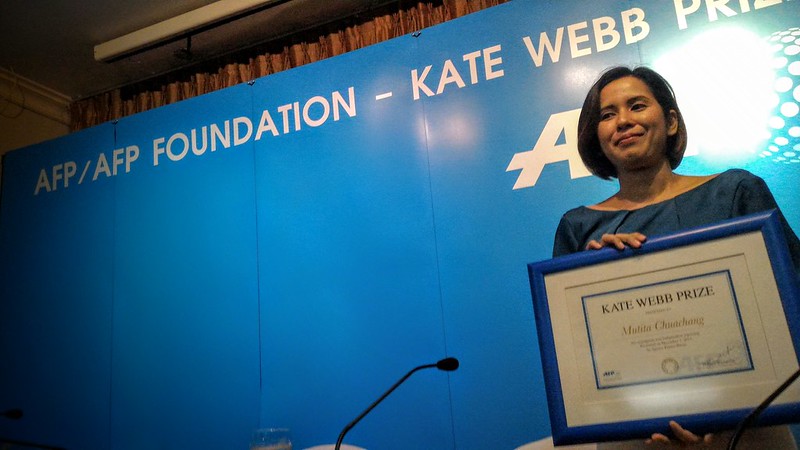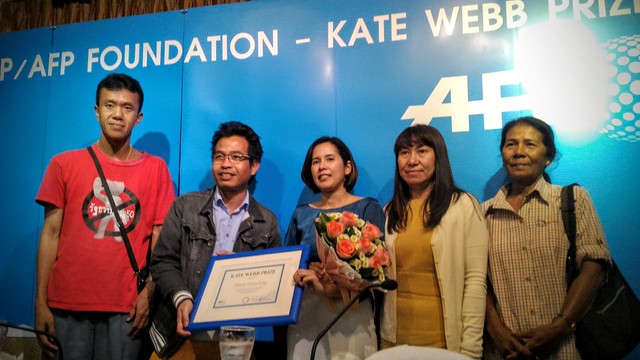Note: Prachatai journalist Mutita Chuachang on Tuesday, 1 December 2015, was awarded the 2015 AFP Kate Webb prize for Asian journalists for her “powerful and persistent” reporting of cases under the lèse majesté law. Mutita, 33, received a certificate and 3,000 euros in a ceremony held at the Foreign Correspondents Club of Thailand (FCCT). Mutita joined Prachatai when the news agency was founded almost 11 years ago. In 2008, Mutita started to cover the first lèse majesté story when Daranee Charnchoengsilpakul, aka Da Torpedo, was arrested for her speech, and later sentenced to 18 years in prison. The following is her acceptance speech. Read more about this award and Mutita here
Mutita Chuachang holds the certificate
Mutita Chuachang poses for photo with former lese majeste prisoners (on her right) and wives of lese majeste prisoners (on her left)
********
Good evening ladies and gentlemen,
It’s my great honor to be speaking in front of you here tonight. First of all, please allow me to express my deepest condolence for what happened in Paris a few weeks ago. May courage be with all of us and may we not lose hope in humanity. It is my sincere hope that we will be able to find solutions to the challenges facing us with the least possible sacrifices by all sides.
Receiving the Agence France-Presse Kate Webb Prize is a great honor for me and for my working life as a journalist. Yet, all of the difficulties that I have sustained during my career are not, in any way, comparable to those faced by war reporters. This is especially the case with Kate Webb, who risked her life several times going to the world’s most dangerous war zones, such as Vietnam, Iraq, Timor Leste, and to the closed country of North Korea.
However, my being awarded such a prestigious prize reflects the importance of the issue of lese majeste, which is one of the primary areas of my reporting, in the eyes of the international media and organizations that closely follow the political situation in Thailand. This is perhaps because it is related to freedom of expression, which is a basic human right, and is an issue which is very difficult to separate from the core problems of Thai politics.
As a journalist, I generally cover various broad social and political issues including human rights violations, environment, education, and people’s movements. It is only in the last 10 years, with the emergence of the color-coded political conflict between the Red Shirts and the Yellow Shirts, that my focus has shifted to be primarily on the cases of political prisoners, including lese majeste cases.
In fact, I first started working on lese majeste cases in 2008 - a year which saw the widespread and intense use of the law against ordinary people who held different political opinions. Its legal content is held by many to be highly problematic and its penalty is draconian. Those who are accused of lese majeste and sentenced under this law are seen as evil in the eyes of the general public – without any second thoughts or further questions asked. What I have done, and do, as a journalist is simply to have conversations with these people who are seen as evil, follow the court proceedings which result in their prison sentences and try to bring this information - which is often hard to obtain – to the attention of the public as much as I can. These are not actions taken out of courage, but done with a purpose of increasing the understanding of people in the society about this issue. It is work done in the hope that one day such problems will be fixed – both in the structure of the law itself and people’s way of thinking. It is my personal belief that if the culture of asking critical questions and acceptance of differences is allowed to grow and develop, we will be able to have more fruitful discussions on the issues and this will eventually lead to the institution of monarchy being stronger and the society as a whole being healthier.
Many years have passed since I became a journalist and since I began reporting on lese majeste cases. My hope remains merely that -- a hope. The use of the lese majeste law appears to have grown even harsher in this very time under the military regime. Trials still continue to take place – not in the civilian Court of Justice but in the military court -- with much higher penalties being meted out . Recently there was a case in which the penalty given reached 50 years imprisonment. The denial of the right to bail remains grave and gaining an access to the accused, which was already an uphill task, has become even more difficult. Trials have often been conducted behind closed doors to the point that hardly any space remains for public consumption of factual information about the cases. Not to mention the recent case of a sudden death in custody, which remains an utter mystery. All of these restrictions and limitations also mean that journalists in this field -- during this very period of time -- have to face increased challenges.
Having said all of this, looking on the bright side, there is still a great deal of enthusiasm by individuals and groups who take action, in whatever ways they can, to foment change. This is what keeps me going. In fact I am just one tiny piece of a large jigsaw: without the works of many others, our understanding of the lese majeste issue would remain incomplete.
I, therefore, would like to convey my words of gratitude and hope and I would like to share this very special prize with my colleagues, my networks – both local and international -- my family, and most importantly, the families of the lese majeste victims who suffer silently and solitarily in this society.
Thank you.


